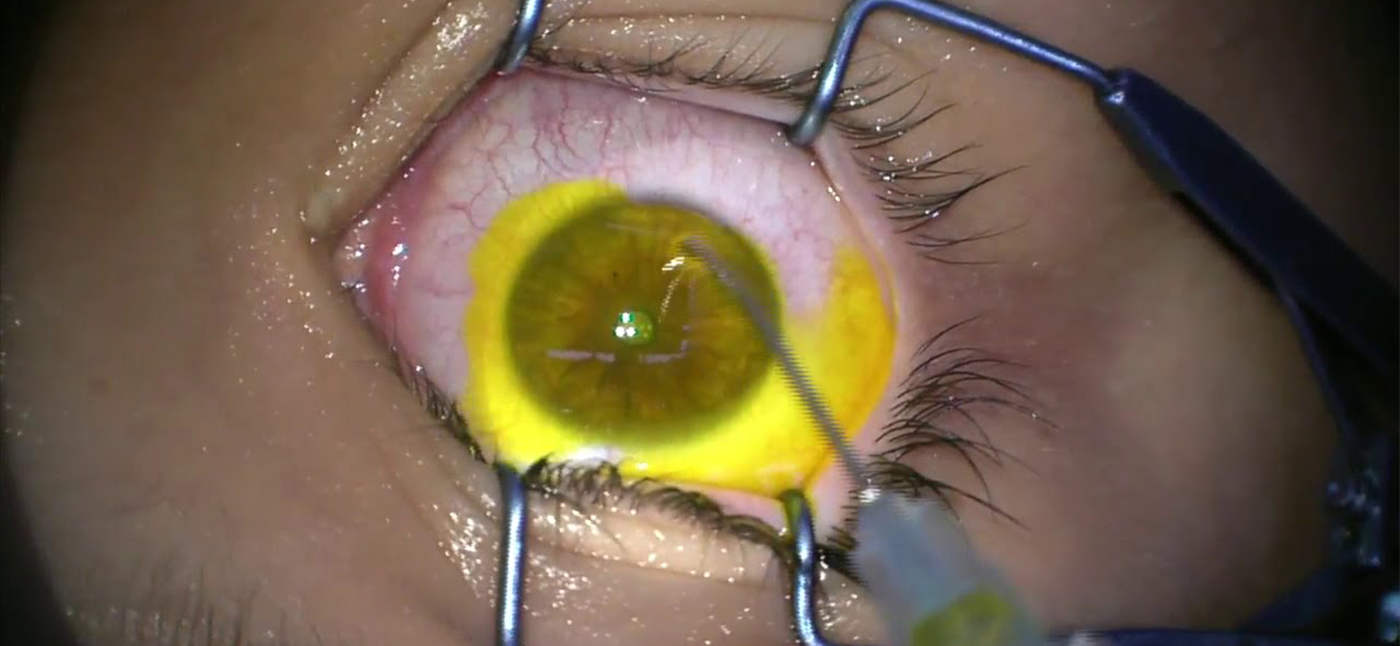Complications of Corneal Collagen Cross-Linking (CXL)
May 13, 2024
HEALTH,INSIGHTSCorneal Collagen Cross-Linking (CXL) is a minimally invasive procedure that strengthens the cornea, the clear dome-shaped structure at the front of your eye. This guide explores common CXL complications, individuals at higher risk, how doctors manage these issues, and the future of CXL.

Corneal collagen cross-linking (CXL) isn't magic for strengthening the cornea, but it is a powerful tool. It's known for its safety and effectiveness, like any medical procedure. However, it comes with potential drawbacks.
What is Corneal Collagen Cross-Linking (CXL)?
Corneal Collagen Cross-Linking (CXL) is a minimally invasive procedure. It strengthens the cornea, the clear dome-shaped structure at the front of your eye. The cornea helps focus light entering your eye, and a healthy cornea is crucial for good vision. CXL typically treats keratoconus, a condition that causes the cornea to thin and bulge outward like a cone. This can distort vision and make it difficult to see clearly. CXL can also treat other corneal conditions that weaken the cornea.
Who Can Get CXL?
CXL isn't a one-size-fits-all solution, but it can be a good option for people with specific corneal conditions. The main candidate for CXL is someone diagnosed with keratoconus, where the cornea thins and weakens. Here's a breakdown of who might benefit from CXL:
- People with progressive keratoconus: If your keratoconus is getting worse and causing vision problems, glasses or contacts might not correct these. In these cases, CXL can help stabilize the cornea and prevent further vision loss.
- People with corneal ectasia: This is a general term for corneal weakening. This can occur after LASIK surgery or other corneal procedures. CXL can help strengthen the cornea and reduce the risk of further complications.
Corneal Collagen Cross-Linking Process
The Corneal Collagen Cross-Linking (CXL) process involves strengthening the cornea. It uses a combination of light and a vitamin solution. Here's a breakdown of the typical steps:
- Riboflavin Soak: Your doctor will apply riboflavin (vitamin B2) eye drops to your cornea. This solution needs time to soak in, usually around 30 minutes.
- Epithelial Removal (Optional): In some cases, the doctor might gently remove the top layer of your corneal cells (epithelium). Thus, this allows better penetration of the riboflavin. This step may not be necessary for all variations of CXL.
- Ultraviolet Light Application: A special device focuses a controlled dose of ultraviolet (UV) light onto your cornea. The UV light activates the riboflavin. Thus, this triggers a process that creates new cross-links between collagen fibers within the cornea. This strengthens and stabilizes the corneal structure.
- Post-Procedure Care: After the procedure, you'll likely wear an eye patch for a short time to protect your eye while it heals. You'll also be prescribed medications to reduce inflammation and prevent infection.

Complications of CXL
Even though Corneal Collagen Cross-Linking (CXL) is a well-regarded procedure, it's not without potential drawbacks. Here's a look at some of the complications that can occur:
- Infection: As with any eye procedure, there's a slight risk of infection after CXL. This is why doctors prescribe antibiotic eye drops after the procedure.
- Corneal Haze: This refers to a clouding of the cornea that can develop after CXL. It's usually temporary and treatable with medications, but in rare cases, it might be persistent and affect vision.
- Pain and Discomfort: Temporary discomfort and irritation are common after CXL. But they typically subside within a few days with medication.
- Vision Fluctuations: You might experience blurry or fluctuating vision for a short while after the procedure as your cornea heals.
- Endothelial Cell Damage: The endothelium is a layer of cells on the back of the cornea. In some cases, CXL can damage these cells, which can affect corneal health in the long term. This risk is being minimized with advancements in CXL techniques.
- Sterile Infiltrates: These are small white spots that can appear within the cornea after CXL. They're usually harmless and go away on their own, but your doctor will monitor them.
How to Manage Complications of CXL
Complications from corneal collagen cross-linking (CXL) are rare. But they can include infection, corneal haze, pain, vision fluctuations, endothelial cell damage, and sterile infiltrates. In the event of an infection, doctors prescribe stronger antibiotic or antimicrobial eye drops. They also monitore closely eye health.
They may treat corneal haze with corticosteroids or additional laser procedures. Pain and discomfort is manageable with pain relievers and lubricating eye drops. Temporary vision fluctuations are normal during healing.
Doctors monitor endothelial cell damage closely, with artificial tears or corneal transplantation considered in severe cases. Sterile infiltrates typically resolve on their own and they monitor them during follow-up appointments.
Corneal Collagen Cross-Linking Costs
Corneal Collagen Cross-Linking (CXL) is a valuable procedure for strengthening a weakened cornea, but it comes at a cost. Here's a table outlining the average cost of CXL in various European countries:
| Country | Average Cost (Euro) |
| Germany | 2,000 |
| France | 2,500 |
| United Kingdom | 1,800 |
| Spain | 2,200 |
| Italy | 1,900 |
With Wupdoc, you can easily find top doctors and clinics specializing in Corneal Collagen Cross-Linking (CXL), a procedure aimed at strengthening the cornea. Our platform allows you to effortlessly compare prices, services, and treatment options offered by various clinics and practitioners. Whether you're seeking CXL specialists or considering corneal collagen cross-linking, our user-friendly interface simplifies the process of finding your ideal treatment provider. Say goodbye to uncertainty and hello to clearer vision with Wupdoc!
top 5 doctors & clinics in Corneal Collagen Cross Linking, Turkey:
 5.0Turkey, İstanbul
5.0Turkey, İstanbulEye Care
Associate Professor Muhammet Derda OZER, F.I.C.O.Expert Ophthalmologist | Ocular Oncology & Vitreoretinal SpecialistAssoc. Prof. Muhammet Derda OZER specializes in ocular oncology, vitreoretinal diseases, cataract, refractive, corneal transplantation, glaucoma, and pediatric ophthalmic surgery, performing over 30,000 operations. He graduated from Istanbul Medical Faculty (2010), completed ophthalmology residency there (2011-2016), and trained at Wills Eye Hospital, USA. He holds the prestigious F.I.C.O. title, received an ICO fellowship in Vitreo-Retina at the University of Kansas, and earned the ECFMG certification (2024). Assoc. Prof. OZER has authored and co-authored more than 40 peer-reviewed publications in prominent ophthalmology journals.
# 1
 4.8Turkey, Antalya
4.8Turkey, AntalyaEye Care
Established in 1991 in Antalya, the Orbit Medical Centre offers top-notch medical services to the city and the Mediterranean region. The Centre's emphasis on collective efforts and professional interdependence has earned it a reputation as the premier ophthalmological care provider in the region. With its advanced infrastructure, the Centre's ophthalmologists share their knowledge and experience, with particular focus on excimer laser, cataract, glaucoma, keratoconus, and diabetic treatments. The Centre upholds ethical and deontological principles, and prioritizes patient treatment over commercial interests, resulting in patients' trust and establishing the Centre as a model organization.
# 3
 5.0Turkey, Antalya
5.0Turkey, AntalyaEye Care
Private Antalya Kaya Eye Center, which started its activities in 2012, has developed its technical equipment and physical conditions, and provides services with its expert physicians experienced in eye diseases and treatment in Lara / Dedeman region. It aims to gain the rightful trust of our patients today by complying with ethical and deontological working principles without commercial concern in the understanding of "wę i should do what we want to do to our own relatives" to each patient.It aims to combine technology with medical science by incorporating all the devices and measuring instruments that should be found in an eye clinic with superior technological opportunities in eye diseases and treatment.
# 5
Get a Free Quote
Let Us Help You Find the Best Doctors for Your Needs
Fill out the form, and an assistant will contact you shortly to discuss your needs and guide you to top specialists.

Table of Contents
read this next:
Apr 03, 2024
HEALTH,TECHNOLOGYThe Comprehensive Guide to LASIK
Are you tired of the daily struggle with glasses and fumbling to find them every morning? Picture this: waking up to a world seen in crystal-clear detail without reaching for your specs. LASIK surgery, the groundbreaking laser eye treatment, offers the chance to say goodbye to glasses and contacts once and for all.
Looking for the Right Treatment?
Let us find the best doctors & clinics you need. Get your free quote today!
Get a Free Quote


